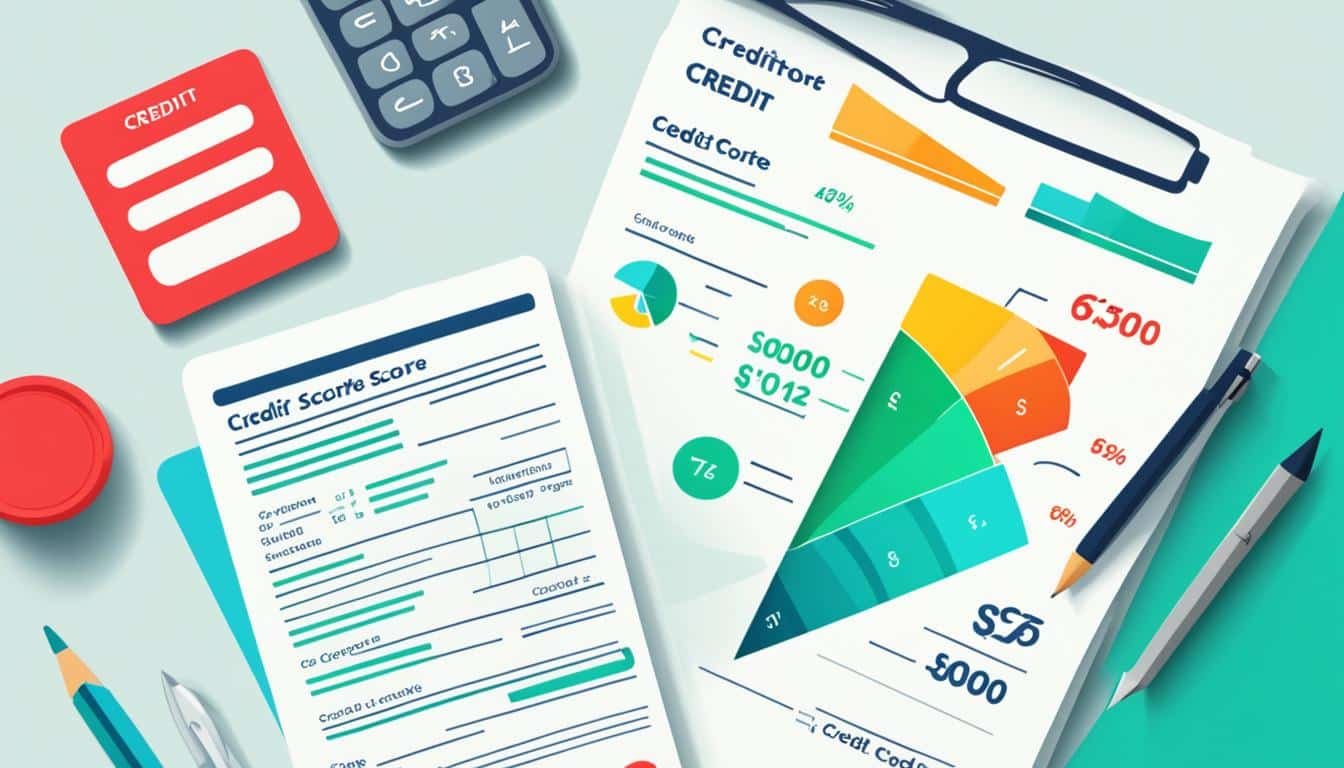How Important Are Credit Scores in Personal Finance?
Credit scores impact our financial lives a lot. They play a big role when we want loans or check our financial health. Lenders use them to see if we’re a good risk to lend money to.
These scores range from 300 to 850. A higher score is better. The FICO score is widely used. It helps lenders understand if someone is likely to pay back a loan.
To manage our finances well, it helps to know about credit scores. Learning how they’re figured out can help us make smart choices. This can improve our financial future.
Key Takeaways:
- Credit scores significantly impact personal finance, influencing loan approvals and interest rates.
- Lenders use credit scores to evaluate creditworthiness and determine borrowing risks.
- A credit score is a three-digit number that ranges from 300 to 850, with higher scores being more favorable.
- The FICO score, developed by Fair Isaac Corporation, is the most widely used credit scoring system.
- Understanding how credit scores are calculated and maintained is important for effective financial management.
How Your Credit Score Affects You
Your credit score really matters for your finances. It can impact how much you pay on loans. For example, a higher score means you might pay less each month. But if your score is lower, you could end up paying more over time.
It’s also crucial for getting credit cards. High scores mean you could get lower rates and better deals. This gives you more choices and the chance to save money.
Your score is a big deal when applying for a mortgage. It tells lenders how reliable you are. With a high score, you’re seen as less risky. So, you might get a loan with a lower interest rate. But, a lower score makes lenders see you as a bigger risk. This means you could pay more in the long run.
Here’s a simple example. Imagine you have two loan options:
| Loan Amount | Interest Rate | Loan Term | Monthly Payment | |
|---|---|---|---|---|
| Offer 1 | $250,000 | 3.5% | 30 years | $1,122 |
| Offer 2 | $250,000 | 4.5% | 30 years | $1,266 |
Notice how a 1% higher interest rate can mean paying $144 more each month. Over 30 years, that’s over $50,000. So, a better credit score can really save you a lot of money.
Good credit is important for credit cards too. With a high score, you might get cards that offer lower rates and better rewards. This means more money in your pocket and more ways to buy things. Plus, it could help you get cards with special benefits.
To keep a good credit score, be smart with your money. Paying on time, not using too much credit, and managing credit well can boost your score. This gives you better chances for loans and credit cards.
In the next section, we will delve into the factors that determine your credit score and how it is calculated.
Determining Your Credit Score
Knowing how credit scores work is key to good money handling. Credit scores tell lenders how likely you are to pay back loans. They look at many things to figure out your score.
Credit Bureaus: Credit bureaus are big in setting your credit score. They keep track of your credit info, like if you pay bills on time, how much credit you use, your credit’s age, the kinds of credit you have, and new credit checks. In America, Equifax, Experian, and TransUnion are the three main bureaus.
Credit Scoring Model: A scoring model crunches numbers to give you a credit score. The most popular model is FICO, made by Fair Isaac Corporation. FICO scores range from 300 to 850. The higher your score, the less risky you seem. Different bureaus use different models but the idea is the same.
Let’s break down what goes into your credit score:
- Payment History (35%): This looks at how often you pay bills on time.
- Credit Utilization (30%): It checks how much of your credit limit you use.
- Length of Credit History (15%): How long you’ve had credit and managed it matters.
- Type of Credit (10%): The mix of your credit, like cars, homes, and cards, influences your score.
- New Credit Inquiries (10%): Opening new credit accounts can affect your score.
Here’s a table showing what matters and how much:
| Factor | Weight |
|---|---|
| Payment History | 35% |
| Credit Utilization | 30% |
| Length of Credit History | 15% |
| Type of Credit | 10% |
| New Credit Inquiries | 10% |
Understanding these details helps you get better credit scores. It’s smart to check your credit reports often for mistakes and fix them.

Knowing how scores are figured out can help you handle your money better. This way, you can raise your credit score over time.
The Benefits of Good Credit
Good credit helps your money situation a lot. It means you can easily get loans or buy stuff on credit with good terms. This is because lenders trust you more.
With good credit, you are likely to get approved for loans and credit cards. Lenders see you as a safe bet. You can get the money you need easily for big buys or emergencies.
Also, you’ll pay less in interest. This is because banks think you’re not likely to miss payments. So, they give you better interest rates. Over time, you save a lot of money this way.
Good credit also gets you better deals on loans. You might get a bigger credit limit, more time to pay, or fewer fees. These things help a lot when you’re trying to pay off a loan or use credit wisely.
It’s not just loans, though. Landlords and insurance companies look at your credit score too. A high score can help you rent a nice place or lower your insurance costs.
In the end, good credit shows you’re responsible. It means you handle money well and can meet your financial duties. And that feels good. Plus, it can help you dream bigger about your money future.
To enjoy these benefits, keep your credit in good shape. Pay bills on time, don’t use too much of your credit, and check your credit report often. Fix any mistakes as soon as you find them.
Conclusion
Keeping a strong credit score is key for healthy finances. Know what affects your score and act responsibly to boost it. Check your report often and fix any mistakes.
Good credit opens doors to lower rates and more financial safety. By working on your credit, you set yourself up for better money options. This is vital for anyone wanting to handle their money well.







